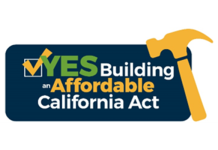
It’s politically popular these days to talk about making the Golden State more affordable, perhaps because we can no longer ignore the impossibly high hurdles standing in the way of the California Dream.
We’ve fallen too far behind in building the infrastructure that our communities desperately need. And the projects that make it through the broken permitting process become so expensive that they raise costs for all of us.
It wasn’t supposed to be this way.
In 1970, lawmakers created the California Environmental Quality Act (CEQA) and promised “productive harmony to fulfill the social and economic requirements of present and future generations.”
Sadly, that promise was broken long ago.
California’s future is being held back by its past.
The ‘Building an Affordable California Act’
The California Chamber of Commerce has filed a voter initiative to modernize and streamline the review process for building the state’s most essential projects.
The initiative was carefully crafted to protect the environment while ensuring that plans for much-needed housing, clean energy, reliable water supplies, and public health and safety facilities are reviewed in a timely manner.
Balance, Not Bureaucracy
For decades, oversight has too often been co-opted by obstruction, threatening the common good:
- A multifamily housing project in Contra Costa County weathered a decade of lawsuits, a ballot referendum, and more than 100 public hearings before an appeals court dismissed the CEQA objections in 2022.
- The lengthy CEQA process over plans to link electricity transmission lines to renewable energy resources in the Imperial Valley extended the project by seven years.
- A plan to move the Alameda Food Bank across the street to a new facility was delayed after two residents argued that CEQA required the preservation of a “historic” parking lot.
- When the University of California, Berkeley proposed badly needed student housing, opponents crafted a novel argument that CEQA covered the impact of noise made by students.
- Nine years passed between state officials initiating review of reinforcements of Perris Dam in Riverside County and final approval by an appeals court.
- Plans for a bicycle path near the Los Angeles River have been challenged under CEQA because opponents claim it might frighten horses that use a nearby trail.
These kinds of delays add billions of dollars in costs while making it harder to meet the state’s affordability and environmental goals.
Timely Decisions, Protected Safeguards
Legislators have previously approved narrow project exemptions, but it’s time to actually modernize the 55-year-old law.
The Building an Affordable California Act restores the “productive harmony” that’s been cast aside over the past five decades:
- Essential projects would be subject to sensible, firm deadlines for environmental review.
- Government officials would have 365 days to approve or deny applications. After that, applicants could ask for a public hearing and a final vote within 60 days.
- Options to resolve concerns would be limited to either the proposed project, an alternative that reduces environmental impacts, or no project at all.
- There would be new timelines for legal challenges, too. Courts would be required to distinguish between reasonable concerns and those of activists whose “not in my backyard” viewpoints currently are allowed to delay or deny vital projects.
- Communities retain their control over approving local development. This is not a one-size-fits-all approach to meeting California’s needs.
- Essential projects must meet the state’s strong labor standards and protections.
- Important environmental protections such as mitigation, habitat protection, and public comment periods would remain in place.
The initiative will create predictability for improvements the state desperately needs – including the building of first responder facilities, wildfire resilience projects, and broadband in underserved communities.
Californians deserve a law that recognizes prosperity isn’t the enemy of preservation.
Modernizing that law won’t just ease California’s affordability crisis and boost our economy – it will prove the naysayers wrong about our state.
Let’s get busy. It’s time to build an affordable California.


